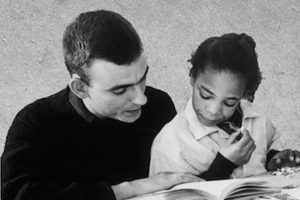
Jonathan Daniels
*Jonathan Daniels was born on this date in 1939. He was a white-American Episcopal seminarian and civil rights activist.
Jonathan Myrick Daniels was born in Keene, New Hampshire; he was the son of Phillip Brock Daniels, a Congregationalist physician, and his wife, Constance Weaver. Daniels considered a career in ministry as early as high school and joined the Episcopal Church as a young man. He attended local schools before graduating from the Virginia Military Institute. He began to question his religious faith during his sophomore year, possibly because his father died and his sister Emily suffered an extended illness simultaneously. He graduated as valedictorian of his class.
In 1961, Daniels entered Harvard University to study English Literature. In 1962, during an Easter service at the Church of the Advent in Boston, Daniels felt a renewed conviction that he was being called to serve God. Soon after, he decided to pursue ordination. After working out of family financial problems, he applied and was accepted to the Episcopal Theological School in Cambridge, Massachusetts, starting his studies in 1963 and expecting to graduate in 1966.
In March 1965, Daniels answered the call of Dr. Martin Luther King Jr., who recruited students and clergy to join the movement in Selma, Alabama, to take part in the march for voting rights from Selma to the state capital of Montgomery. Daniels and several other seminary students left for Alabama on a Thursday, intending to stay the weekend. After Daniels and their friend Judith Upham missed the bus home, they had second thoughts about their short stay.
The two returned to the seminary just long enough to request permission to spend the rest of the semester working in Selma, where they would also study on their own and return at the end of the term to take exams. In Selma, Daniels stayed with a local African American family. During the next months, Daniels worked to integrate the local Episcopal Church by taking groups of young Blacks to the church. The church members were not welcoming. Daniels returned to the seminary to take his semester exams and passed.
He returned to Alabama in July to continue his work. He helped assemble a list of federal, state, and local agencies that could assist those in need. He also tutored children, helped poor locals apply for aid, and worked to register voters. That summer of 1965, Congress passed the Voting Rights Act. On August 14, 1965, Daniels was one of 29 protesters, including members of the Student Nonviolent Coordinating Committee (SNCC), who went to Fort Deposit, Alabama, to picket its whites-only stores. All protesters were arrested and taken to jail in the nearby town of Hayneville. The police released five juvenile protesters the next day. The rest of the group was held for six days; they refused to accept bail unless everyone was bailed.
On August 20, 1965, the prisoners were released back to Fort Deposit without transport. After release, the group waited near the courthouse jail while one of their members called for transport. With three others, Father Richard F. Morrisroe (a white Catholic priest), Daniels, and two black female activists walked to buy a cold soft drink at nearby Varner's Cash Store, one of the few local places to serve Blacks. But barring the front was Tom L. Coleman, an unpaid special deputy holding a shotgun with a pistol in a holster. Coleman threatened the group and leveled his gun at seventeen-year-old Ruby Sales. Daniels pushed Sales down, catching the full blast of the shotgun, and was killed instantly. Morrisroe grabbed activist Joyce Bailey and ran with her. Coleman shot Morrisroe, severely wounding him in the lower back, and then stopped firing. Upon learning of Daniels' murder, Martin Luther King, Jr. stated, "One of the most heroic Christian deeds of which I have heard in my entire ministry was performed by Jonathan Daniels."
His death generated further support for the Civil Rights Movement. In 1991, Daniels was designated as a martyr in the Episcopal Church and is recognized annually. He is memorialized in the Civil Rights Movement and other venues. A grand jury indicted Coleman for manslaughter. Richmond Flowers, Sr., the Attorney General of Alabama, believed the charge should have been a murder and intervened in the prosecution, but was thwarted by the trial judge. He refused to wait until Morrisroe had recovered enough to testify and removed Flowers from the case. Coleman claimed self-defense and was acquitted of manslaughter charges by an all-white jury. Coleman continued working as an engineer for the state highway department. He died in 1997 without having faced further prosecution.
The murder of a white seminarian/activist defending an unarmed teenage girl shocked members of the Episcopal Church and other whites into facing the reality of racial inequality in America. Other members worked to continue the civil rights movement and work for social justice. Ruby Sales went on to attend Episcopal Theological School (now Episcopal Divinity School). She works as a human rights advocate in Washington, D.C., and founded an inner-city mission dedicated to Daniels.
